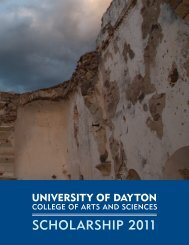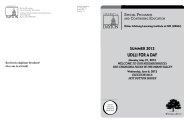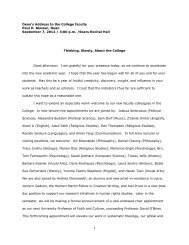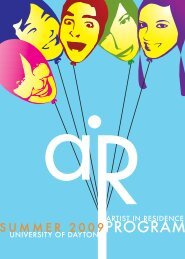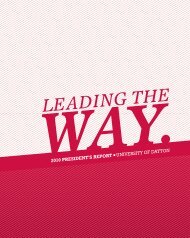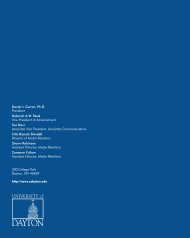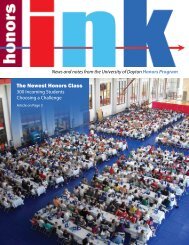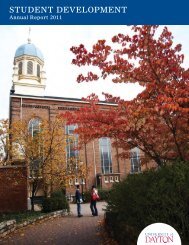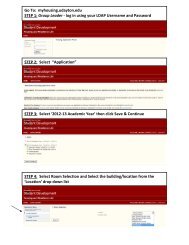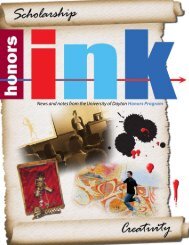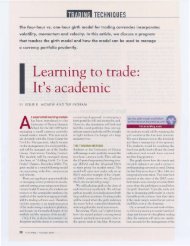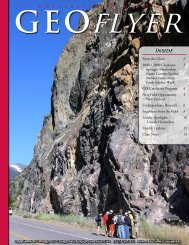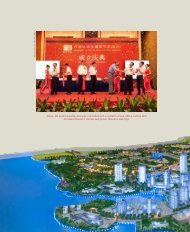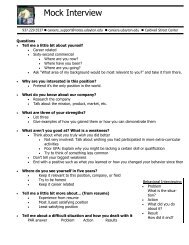EXERCISE PHYSIOLOGY PROGRAM (EEP) - University of Dayton
EXERCISE PHYSIOLOGY PROGRAM (EEP) - University of Dayton
EXERCISE PHYSIOLOGY PROGRAM (EEP) - University of Dayton
Create successful ePaper yourself
Turn your PDF publications into a flip-book with our unique Google optimized e-Paper software.
<strong>EXERCISE</strong> <strong>PHYSIOLOGY</strong><br />
<strong>PROGRAM</strong> (<strong>EEP</strong>)<br />
STUDENT HANDBOOK<br />
DEPARTMENT OF HEALTH<br />
AND SPORT SCIENCE<br />
<strong>Dayton</strong>, OH 45469-1210<br />
2011-2012
Letter from Faculty<br />
TABLE OF CONTENTS<br />
Mission Statement 1<br />
Exercise Physiology Checksheet 2<br />
Basic Competencies and General Education Requirements 3-4<br />
Thematic Cluster 5-6<br />
Support Services 7<br />
Grievance Procedures 8<br />
Transfer Students 9-10<br />
Academic Advising 11-13<br />
Academic Standing 14<br />
Pr<strong>of</strong>essional Enrichment Activities 15-17<br />
Class Attendance 18<br />
Course Syllabi 19<br />
Department Committees 20<br />
Evaluation <strong>of</strong> Courses, Pr<strong>of</strong>essors, and Programs 21<br />
Student Awards 22<br />
Grading Options 23<br />
Academic Honor Code 24
DATE: August 2011<br />
TO: First-Year and Undergraduate Transfer Students in the Department <strong>of</strong> Health and<br />
Sport Science<br />
FROM: Janine T. Baer Lloyd L. Laubach<br />
Jennifer Dalton Jon K. Linderman<br />
Corinne Daprano Kimberly Ritterh<strong>of</strong>f<br />
George DeMarco Peter J. Titlebaum<br />
Gerry J. Gallo<br />
Welcome to the Department <strong>of</strong> Health and Sport Science. We are pleased that you have chosen to<br />
pursue your undergraduate education in one <strong>of</strong> our programs.<br />
The faculty, staff, and students in the Department are committed to assisting you in your goal <strong>of</strong><br />
becoming a pr<strong>of</strong>essional in your field <strong>of</strong> study. The effort which you put forth in your coursework, field<br />
experiences, class attendance, and pr<strong>of</strong>essional involvement will be a major factor in reaching these<br />
pr<strong>of</strong>essional goals and in achieving the highest level <strong>of</strong> academic excellence.<br />
This handbook contains guidelines, policies, and information required for completing your<br />
undergraduate degree. It is YOUR RESPONSIBILITY to understand and fulfill the requirements and<br />
obligations <strong>of</strong> this handbook. Take the time to read it thoroughly and retain it as a guide throughout<br />
your years <strong>of</strong> study. Feel free to ask our faculty any questions you have regarding the information in<br />
this handbook.<br />
Best wishes for a successful college career.<br />
SCHOOL OF EDUCATION AND ALLIED PROFESSIONS<br />
DEPARTMENT OF HEALTH AND SPORT SCIENCE<br />
300 College Park <strong>Dayton</strong>, Ohio 45469-1210<br />
Telephone (937) 229-4225 FAX (937) 229-4244 E-mail: hss@udayton.edu<br />
Dietetics; Exercise Physiology; Exercise Science; Nutrition; Physical Education; Physical Therapy; Pre-Physical Therapy; Sport Management
MISSION STATEMENT<br />
The mission <strong>of</strong> the Department <strong>of</strong> Health and Sport Science is to prepare students to be highly<br />
qualified pr<strong>of</strong>essionals in the health and sport science disciplines.<br />
The Department also believes its mission is to provide educational programs and instruction for the<br />
health fitness needs <strong>of</strong> all members <strong>of</strong> the <strong>University</strong> community.<br />
On the undergraduate level, Exercise Physiology graduates typically pursue MS/PhD programs in<br />
exercise physiology and/or nutritional biochemistry as well as pr<strong>of</strong>essional doctoral programs in<br />
Physical Therapy, Pharmacy, Chiropractic, Medicine, Dentistry, and Veterinary Medicine. Those not<br />
pursuing graduate school but have the requisite communications skills will be prime candidates for<br />
positions in the pharmaceutical, consumer products, medical equipment, and/or fitness industries.<br />
The Exercise Science Program is designed to prepare students for pr<strong>of</strong>essional opportunities in areas<br />
<strong>of</strong> corporate health, "wellness" programs, and health maintenance in a variety <strong>of</strong> settings. The<br />
Nutrition and Dietetics Programs prepare students for post-baccalaureate dietetic internships or<br />
prepr<strong>of</strong>essional practice programs. The Department prepares educators in Physical Education to<br />
meet the needs <strong>of</strong> the public and private schools. The Pre-Physical Therapy Program will prepare<br />
students for graduate school in Physical Therapy or other allied pr<strong>of</strong>essions. The Sport Management<br />
Program is designed to prepare students for pr<strong>of</strong>essional opportunities in private sports clubs, health<br />
clubs, sports organizations/federations, newspapers, television, sporting goods, and the multitudinous<br />
areas <strong>of</strong> recreation. On the graduate level, the Department <strong>of</strong>fers the Master <strong>of</strong> Science Degree in<br />
Education/Exercise Science and the Doctor <strong>of</strong> Physical Therapy Degree.<br />
In all the Department's activities, there is a constant search for excellence. The long-range goals and<br />
strategies relate to this search in teaching, research, inquiry, programs, recruitment <strong>of</strong> quality<br />
students, and service.<br />
1
<strong>University</strong> <strong>of</strong> <strong>Dayton</strong> - Health and Sport Science<br />
Name _____________________________ Effective School Year 2011-2012<br />
RELIGION/PHILOSOPHY (12 semester hours required)<br />
REL 103 Introduction to Religion 3<br />
PHL 103 Introduction to Philosophy 3<br />
1 REL ______ 3<br />
1 PHL ______ 3<br />
BASIC SKILLS (15 semester hours required)<br />
CMM 110 Group Decision Making 1<br />
CMM 111 Informative Public Speaking 1<br />
OR<br />
CMM 112 Persuasive Public Speaking 1<br />
CMM 113 Interviewing 1<br />
2 ENG 101 College Composition I 3<br />
2 ENG 102 College Composition II 3<br />
MTH 148 Introductory Calculus I 3<br />
MTH 207 Introduction to Statistics 3<br />
SCIENCE (42 semester hours required)<br />
BIO 151 Concepts <strong>of</strong> Biology I 3<br />
BIO 151L Concepts <strong>of</strong> Biology Lab I 1<br />
BIO 152 Concepts <strong>of</strong> Biology II 3<br />
BIO 152L Concepts <strong>of</strong> Biology Lab II 1<br />
BIO 312 General Genetics 3<br />
BIO 403 Physiology I 3<br />
BIO 403L Physiology I Lab 1<br />
CHM 123 General Chemistry 3<br />
CHM 123L General Chemistry Lab 1<br />
CHM 124 General Chemistry 3<br />
CHM 124L General Chemistry Lab 1<br />
CHM 313 Organic Chemistry 3<br />
CHM 313L Organic Chemistry Lab 1<br />
CHM 314 Organic Chemistry 3<br />
CHM 314L Organic Chemistry Lab 1<br />
CHM 420 Biochemistry 3<br />
PHY 201 General Physics 3<br />
PHY 201L General Physics Lab 1<br />
PHY 202 General Physics 3<br />
PHY 202L General Physics Lab 1<br />
<strong>EXERCISE</strong> <strong>PHYSIOLOGY</strong> (<strong>EEP</strong>)<br />
SOCIAL & ART STUDIES (12 semester hours required)<br />
PSY 101 Introduction to Psychology 3<br />
PSY 251 Human Growth & Development 3<br />
PSY 366 Health Psychology 3<br />
_____ _____ Arts Study Elective 3<br />
HISTORY (6 semester hours required)<br />
HST 103 West and World 3<br />
HSS 275 History <strong>of</strong> Physical Activity/Sport 3<br />
HEALTH & SPORT SCIENCE (43 semester hrs required)<br />
HSS 101 Introduction to the <strong>University</strong> 1<br />
HSS 112 Introduction/Exercise Science 2<br />
3 HSS 184 Conditioning 1<br />
HSS 226 Computer Apps/Sport Science 3<br />
3 HSS 295 Nutrition and Health 3<br />
3 HSS 305 Human Anatomy 3<br />
3 HSS 305L Human Anatomy Lab 1<br />
3 HSS 307 Human Physiology 3<br />
HSS 335 Introduction/Athletic Training 3<br />
HSS 345 Medical Evaluation & Terminology 3<br />
HSS 405 Tests and Measurements 3<br />
3 HSS 408 Physiology <strong>of</strong> Exercise 3<br />
3 HSS 408L Physiology <strong>of</strong> Exercise Lab 1<br />
3 HSS 409 Kinesiology 3<br />
3 HSS 409L Kinesiology Lab 1<br />
HSS 422 Exercise/Special Populations 3<br />
HSS 428 Research/Physical Activity & Health 3<br />
HSS 455 Selected Studies/Exercise Science 3<br />
RECOMMENDED ELECTIVES IF INTENDING TO APPLY<br />
TO MEDICAL SCHOOL<br />
BIO 411 General Microbiology 3<br />
BIO 411L General Microbiology Lab 1<br />
BIO 440 Cell Biology 3<br />
MTH 149 Introductory Calculus II 3<br />
NOTES<br />
130 semester hours are required for graduation.<br />
1 Recommended REL/PHL - REL 360 Christian Ethics, REL 367 Christian Ethics in Health Care, REL 368 Christian Ethics in the<br />
Business World, PHL 312 Ethics, PHL 313 Business Ethics, PHL 315 Medical Ethics.<br />
2 If placed in ENG 114 or 198, the English requirement is complete.<br />
3 All must be completed, along with HSS 320-Essentials <strong>of</strong> Strength and Conditioning, in order to fulfill the requirements for the<br />
NSCA’s Education Recognition Program in Strength and Conditioning.<br />
Transfers from junior colleges must have 54 semester hours at UD; 45 <strong>of</strong> which must be upper level.<br />
All science courses must be taken at the <strong>University</strong> <strong>of</strong> <strong>Dayton</strong> or an equivalent college or university.<br />
2
BASIC COMPETENCIES AND GENERAL EDUCATION REQUIREMENTS<br />
A. Basic Competencies - The <strong>University</strong> requires all students to show pr<strong>of</strong>iciency in basic<br />
competencies.<br />
a. Language skills -- ENG 101-102 (114 or 198) and CMM 110, 111/112, and 113<br />
b. Mathematics - Requirements met by passage <strong>of</strong> the QRC Module 1 and<br />
passage <strong>of</strong> MTH 207 with a C- or better. To satisfy QRC Module 1, you must<br />
pass an online examination with minimum score <strong>of</strong> 80%. You have already<br />
taken this online examination as part <strong>of</strong> the online placement exam in<br />
virtual orientation. You have already received an email message through<br />
your Lotus Notes account in which you have been told if you have passed<br />
this exam as part <strong>of</strong> the online placement exam. If that email is positive,<br />
you have satisfied Module 1. If that email was not positive, that email<br />
message sent you to http://webct.udayton.edu to find an online tutorial<br />
and directions for retaking the exam. To enter the website given above,<br />
you must use the password given to you in the email message. If you do<br />
not recall the password, take your <strong>University</strong> picture ID to 53 Miriam Hall<br />
from 8 AM - 5 PM Monday through Friday. Someone there will help you with<br />
resetting your password. If you have questions, please contact your<br />
academic advisor or your Dean's <strong>of</strong>fice.<br />
B. General Education<br />
1. Students entering UD on or after fall term 1985 must meet the <strong>University</strong> General<br />
Education requirements. These consist <strong>of</strong> 10 courses (30 semester hours) as<br />
specified below.<br />
a. Philosophy and Religious Studies - PHL 103 and REL 103, along with<br />
two other courses to total four, are required.<br />
b. Historical Study - Two courses, West and World (HST 103) and History <strong>of</strong><br />
Sport and Physical Education (HSS 275).<br />
c. Physical and Life Sciences - Two courses, Human Anatomy (HSS 305) and<br />
Human Physiology (HSS 307).<br />
d. Social Science – Introductory Psychology (PSY 101).<br />
e. Arts Study – From the list <strong>of</strong> approved courses found at<br />
http://portfolio.udayton.edu/learning/approvedgecourses<br />
2. Program checksheets specify the General Education requirements. In some<br />
cases, students have a choice from a list <strong>of</strong> courses in a particular area (e.g.,<br />
Social Sciences) approved for majors. In still other cases, students have a choice<br />
from the complete list <strong>of</strong> courses in an area approved for the <strong>University</strong>.<br />
3
General Education Requirements<br />
4
THEMATIC CLUSTER<br />
Why are thematic clusters required at UD?<br />
� To provide the opportunity for students to discover connections across academic<br />
disciplines.<br />
� To enable students to further explore the question <strong>of</strong> the Humanities Base, “What does it<br />
mean to be human?” by focusing on a particular theme.<br />
� To help students engage in a richer learning experience by exploring this theme in a<br />
multidisciplinary way.<br />
What is a thematic cluster?<br />
� A cluster is composed <strong>of</strong> courses that focus on a common theme. Each cluster includes<br />
at least three courses from three different domains <strong>of</strong> knowledge.<br />
� The six domains <strong>of</strong> knowledge are:<br />
1. Arts Study<br />
2. Historical Study<br />
3. Philosophy<br />
4. Physical & Life Science<br />
5. Religious Studies<br />
6. Social Science<br />
� Clusters are part <strong>of</strong> general education. They are not an additional requirement but a<br />
way <strong>of</strong> organizing some <strong>of</strong> the general education requirements.<br />
What are important considerations when choosing a cluster?<br />
� Interest in the theme: Individual interest motivates students to raise important questions<br />
and helps connect general education requirements to issues raised in major areas <strong>of</strong><br />
study.<br />
� Timing: Select a cluster after completing the Humanities Base. This should be by the<br />
beginning <strong>of</strong> the sophomore year. Cluster courses should be planned in conjunction with<br />
requirements in the major.<br />
� Compatibility with a major: A student may select any cluster. However, some clusters<br />
are more compatible with specific majors. Consider how a cluster complements a major<br />
area <strong>of</strong> study and how it is compatible with major requirements. Consult with advisors<br />
and departmental chairpersons.<br />
http://portfolio.udayton.edu/clusters<br />
The <strong>University</strong> <strong>of</strong> <strong>Dayton</strong> provides three special programs that fulfill the Thematic Cluster: The<br />
Chaminade Scholars Program, The Core Program, and The Berry Scholars Program. In addition,<br />
the Honors Program <strong>of</strong>fers the opportunity for an integrative cluster project.<br />
http://portfolio.udayton.edu/learning/clustersspecialprograms<br />
5
Thematic Cluster Registration Form<br />
You should choose a thematic cluster after careful thought and consultation with your advisors.<br />
Ideally, you should select a cluster before completing your first year. Review the thematic<br />
cluster pages. Print out this page and fill it out in consultation with your advisor.<br />
Name: __________________Student ID No.: __________Major ________________<br />
_____ I am declaring a Cluster<br />
_____ I am changing to a different Cluster<br />
Check the Cluster you are now declaring:<br />
_____ The Arts and Human Experience<br />
_____ Business Pr<strong>of</strong>essional in a Global Society<br />
_____ Catholic Intellectual Tradition<br />
_____ Cross Cultural<br />
_____ Perspectives on Global Environmental Issues<br />
_____ Social Justice<br />
_____ Values, Technology, and Society<br />
_____ Women and Culture<br />
_____ Self-Defined<br />
Please note that Berry Scholars, Chaminade Scholars, and Core students register for the clusters<br />
through the directors <strong>of</strong> those programs.<br />
Student Signature ___________________________ Date_________________<br />
Advisor’s Name ______________________Advisor’s Department: _______________<br />
Advisor’s Signature ________________________ Date_________________<br />
Please place a copy <strong>of</strong> this in the student’s file and provide your department <strong>of</strong>fice with a<br />
copy.<br />
http://portfolio.udayton.edu/learning/selectingacluster<br />
6
SUPPORT SERVICES<br />
Support service centers provide School <strong>of</strong> Education and Allied Pr<strong>of</strong>essions students and faculty<br />
with assistance in their work.<br />
1. The Center for Technology in Education houses personal computers in Chaminade Hall,<br />
Room 202. These computers are used in classes and for research projects. Phone Ext.:<br />
93149.<br />
2. The Educational Media Center is part <strong>of</strong> LE Technology Services. It is located in the<br />
Roesch Library, Room 30. The Center provides media equipment and materials for<br />
faculty and students. Phone Ext.: 93122.<br />
3. The Curriculum Materials Center, in Chaminade Hall, Room 114, provides a variety <strong>of</strong><br />
services and materials related to elementary and secondary curriculum and teaching.<br />
Phone Ext. 93140.<br />
4. The Dean <strong>of</strong> the School <strong>of</strong> Education and Allied Pr<strong>of</strong>essions is Dr. Kevin Kelly. The Dean’s<br />
<strong>of</strong>fice is in Chaminade Hall, Room 104. Dr. Mary Lou Andrews provides assistance in<br />
certification and related questions. Phone Ext.: 93104.<br />
5. Career Services provides services such as resume critiquing, interview preparation, job<br />
search strategies, on-campus recruiting, and career fairs, among others. Phone Ext.:<br />
92045.<br />
6. Student Learning Support’s goals are to assist students in understanding themselves as<br />
learners, to improve successful course completion rates, and to improve student<br />
retention rates through graduation. To that end, Student Learning Support provides<br />
structured, customized programs and services that meet the unique needs <strong>of</strong> designated<br />
undergraduate populations and the general student population. Phone Ext.: 92066.<br />
7. The Write Place exists to enhance writing competency across the curriculum for students,<br />
faculty, and staff. It strives to create a comfortable, collaborative environment in which<br />
learning can flourish. Phone Ext.: 92066.<br />
8. The Tutoring Program <strong>of</strong>fers individualized and group academic assistance to those<br />
students needing such support beyond the classroom. Phone Ext.: 92066.<br />
9. Through Disability Services, UD is committed to including individuals with disabilities as full<br />
participants in programs, services, and activities. Phone Ext.: 92066.<br />
7
GRIEVANCE PROCEDURES<br />
All students should refer to the Student Handbook for the detailed explanation on Student<br />
Rights, Responsibilities, and Freedoms.<br />
http://www.udayton.edu/~studev/studenthandbook/<br />
If a student has a grievance in the Department <strong>of</strong> Health and Sport Science, he or she should<br />
first talk to the faculty member involved. If the problem is not settled, the remaining steps would<br />
be Chair <strong>of</strong> the Department, Dean <strong>of</strong> the School <strong>of</strong> Education and Allied Pr<strong>of</strong>essions, Provost <strong>of</strong><br />
the <strong>University</strong>, and, finally, the President.<br />
The grievance should be in writing and should be submitted within two weeks after the problem<br />
occurred.<br />
8
TRANSFER STUDENTS<br />
1. Transfer students refer to students coming from another university or those from another<br />
major within the <strong>University</strong> <strong>of</strong> <strong>Dayton</strong>.<br />
2. All transfer students must have a minimum 3.2 cumulative GPA in order to be accepted<br />
into the Exercise Physiology major.<br />
3. After the credentials have been evaluated, the transfer student will be assigned to a<br />
faculty member as advisor.<br />
4. The regular departmental advisory system will take effect at this point.<br />
Transfer <strong>of</strong> Credits/Courses<br />
The Department Chair determines the courses and credits allowed for transfer when a student<br />
enters the Department. Many students wish to take courses at other universities during the<br />
summer term. Appropriate forms and procedures should be gained from the Health and Sport<br />
Science Department <strong>of</strong>fice prior to registration at another university, and all courses must be<br />
approved before registration at another university by the program coordinator or Department<br />
Chair at the <strong>University</strong> <strong>of</strong> <strong>Dayton</strong>.<br />
Procedures:<br />
� Obtain Transient Student Form from HSS <strong>of</strong>fice (see following page).<br />
� Examine catalog <strong>of</strong> other university.<br />
� With advisor, check course content <strong>of</strong> <strong>University</strong> <strong>of</strong> <strong>Dayton</strong> courses with corresponding<br />
course <strong>of</strong> other university, attaching printout <strong>of</strong> corresponding course to Transient Student<br />
Form.<br />
� If approval given, and signed by appropriate personnel, the student may register at<br />
other university.<br />
� Student takes class.<br />
� Student and Health and Sport Science staff obtain grade from other university.<br />
� This course serves to satisfy requirement <strong>of</strong> a <strong>University</strong> <strong>of</strong> <strong>Dayton</strong> <strong>of</strong>fering.<br />
9
Transient Student Request Form<br />
To request approval <strong>of</strong> courses to be taken at another institution<br />
Student Name_________________________________________ Student ID# ___________________<br />
Summer Address<br />
__________________________________________________________________________________<br />
Transient School Course UD Course<br />
Dept. No. and Title Dept. No.<br />
____________________________________________________________________________________________<br />
____________________________________________________________________________________________<br />
____________________________________________________________________________________________<br />
Transient School Name (one/form) ___________________________________________________________<br />
Address: ____________________________________________________________________________________<br />
Upon signature below, the <strong>University</strong> <strong>of</strong> <strong>Dayton</strong> acknowledges that the request has been<br />
reviewed and will accept transfer credit for the equivalent course(s) as indicated, if the student<br />
attains a passing grade as stated in the <strong>University</strong> Bulletin.<br />
Advisor Signature ___________________________________ Date ___________________<br />
Note to student: Upon completion <strong>of</strong> this coursework, please have the Registrar at the<br />
transient school send an <strong>of</strong>ficial transcript to the HSS <strong>of</strong>fice, address below.<br />
Until <strong>of</strong>ficial transcripts are received, no credit for courses may be<br />
conferred. (student initials) _____<br />
SCHOOL OF EDUCATION AND ALLIED PROFESSIONS<br />
DEPARTMENT OF HEALTH AND SPORT SCIENCE<br />
300 COLLEGE PARK<br />
DAYTON, OH 45469-1210<br />
Dietetics, Exercise Physiology; Exercise Science, Nutrition; Physical Education; Physical Therapy; Pre-Physical Therapy; Sport Management<br />
10
Advisory--Role and Responsibilities<br />
ACADEMIC ADVISING<br />
(Revised August 2007)<br />
1. The role <strong>of</strong> the advisor in the Department <strong>of</strong> Health and Sport Science is to serve as a<br />
counselor to students regarding their course <strong>of</strong> study and career choices.<br />
2. Only full-time faculty will serve as advisors to undergraduate majors.<br />
3. Faculty with part-time assignments are not expected to advise majors.<br />
4. Advisors must keep up-to-date on certification, programs, graduation requirements,<br />
course <strong>of</strong>ferings, career opportunities, and other items related to effective advising <strong>of</strong><br />
students.<br />
5. Advisor responsibilities are primarily academic in nature, i.e., assistance in course<br />
selection, sequence, and waivers. Advisors should carefully note advisees' grade reports<br />
and counsel as necessary concerning study habits, course load, career goals, and<br />
related matters.<br />
6. Advisors will make a record <strong>of</strong> any <strong>of</strong>ficial contacts with advisees and assure that such<br />
records are placed in the department student files. The files are always available to<br />
advisors and should be used whenever possible when counseling students.<br />
7. When an assigned advisor is not available, the Department Chair will substitute for the<br />
advisor.<br />
11
Faculty Advisory System<br />
Health and Sport Science Dr. Lloyd Laubach---Phone: 229-4205<br />
Department Chair laubach@udayton.edu<br />
TF 40F<br />
Exercise Physiology Dr. Lloyd Laubach—Phone: 229-4205<br />
laubach@udayton.edu<br />
TF 40F<br />
Exercise Science Dr. George DeMarco---Phone: 229-4210<br />
George.DeMarco@notes.udayton.edu<br />
TF 40K<br />
Pr<strong>of</strong>. Gerry Gallo—Phone: 229-3250<br />
gallogez@notes.udayton.edu<br />
TF 40H<br />
Dr. Lloyd Laubach—Phone: 229-4205<br />
laubach@udayton.edu<br />
TF 40F<br />
Dr. Jon Linderman—Phone: 229-4207<br />
Jon.Linderman@notes.udayton.edu<br />
TF 40J<br />
Pr<strong>of</strong>. Kim Ritterh<strong>of</strong>f—Phone: 229-3975<br />
kritterh<strong>of</strong>f1@notes.udayton.edu<br />
TF 40G<br />
Dietetics Pr<strong>of</strong>. Jennifer Dalton—Phone: 229-4226<br />
jdalton1@notes.udayton.edu<br />
TF 40E<br />
Nutrition & Fitness Dr. Janine Baer—Phone: 229-2157<br />
Janine.Baer@notes.udayton.edu<br />
TF 40B<br />
Physical Education Dr. George DeMarco---Phone: 229-4210<br />
George.DeMarco@notes.udayton.edu<br />
TF 40K<br />
Pre-Physical Therapy Pr<strong>of</strong>. Sean Gallivan—Phone: 229-5606<br />
sgallivan1@notes.udayton.edu<br />
CPC 207F<br />
Dr. Terri Glenn—Phone: 229-5621<br />
Terri.Glenn@notes.udayton.edu<br />
CPC 209B<br />
Dr. Lloyd Laubach—Phone: 229-4205<br />
laubach@udayton.edu<br />
TF 40f<br />
Sport Management Dr. Corinne Daprano---Phone: 229-1025<br />
Corinne.Daprano@notes.udayton.edu<br />
TF 40C<br />
Dr. Peter Titlebaum---Phone: 229-4222<br />
Peter.Titlebaum@notes.udayton.edu<br />
TF 40D<br />
12
Departmental Procedures<br />
l. The instructors for the HSS 111, 112, 113, and 114 courses will orient students to the<br />
registration process.<br />
2. Program coordinators will schedule group or individual meetings each term for the<br />
purpose <strong>of</strong> assisting students with scheduling.<br />
3. Only the advisor or the Department Chair may sign Drop/Add Forms.<br />
4. Files for all major students will be maintained in the departmental <strong>of</strong>fice. No student is<br />
permitted to remove a file from the <strong>of</strong>fice.<br />
Students - Role and Responsibilities<br />
The <strong>University</strong> <strong>of</strong> <strong>Dayton</strong> catalog states: "The responsibility for meeting the <strong>University</strong> and State<br />
requirements rests with the students". The student is cautioned to study the course requirements<br />
and to keep accurate count <strong>of</strong> the semester hours applicable to graduation.<br />
13
ACADEMIC STANDING<br />
The student's academic standing is determined by the cumulative grade point average at the<br />
end <strong>of</strong> each term.<br />
1. To be in good academic standing, a student must have a cumulative grade point<br />
average <strong>of</strong> (a) at least 1.7 at the end <strong>of</strong> the first and second terms, (b) at least 1.8 at the<br />
end <strong>of</strong> the third term, (c) at least 1.9 at the end <strong>of</strong> the fourth term, and (d) at least 2.0 at<br />
the end <strong>of</strong> the fifth and succeeding terms. A block <strong>of</strong> 12 semester hours <strong>of</strong> credit is<br />
considered one term for students who attend on a part-time basis. A cumulative grade<br />
point average <strong>of</strong> at least 2.5 is required for student teaching or internship. A cumulative<br />
grade point average <strong>of</strong> at least 2.0 is required for graduation; 2.5 in the School <strong>of</strong><br />
Education and Allied Pr<strong>of</strong>essions. Students who transfer into the <strong>University</strong> are expected<br />
to maintain a 2.0 cumulative point average to remain in good standing.<br />
2. Any student who has a term point average <strong>of</strong> less than 1.0, regardless <strong>of</strong> cumulative<br />
grade point average, will be dismissed. The Registrar's Office will post the statement<br />
"Academic Dismissal" on the student's permanent record.<br />
3. A cumulative grade point average below the one required will place the student on<br />
academic probation. The student's academic dean will notify the student <strong>of</strong> his or her<br />
probationary status. A student on probation must follow a restricted academic program<br />
not to exceed l5 semester hours.<br />
4. It is the responsibility <strong>of</strong> any student not in good standing (on probation) to complete an<br />
academic contract with the dean for the purpose <strong>of</strong> determining the nature and the<br />
limitations <strong>of</strong> the student's future activities.<br />
5. Beginning with students entering Fall 1986, only six (6) semester hours <strong>of</strong> workshop credit<br />
will be permitted to be counted toward graduation requirements in any undergraduate<br />
program in the department.<br />
14
Introduction<br />
PROFESSIONAL ENRICHMENT ACTIVITIES<br />
Revised June 1998<br />
Merely attending classes and meeting course requirements will not adequately prepare<br />
students to enter the demanding and competitive pr<strong>of</strong>ession <strong>of</strong> health and sport science. The<br />
<strong>University</strong> <strong>of</strong> <strong>Dayton</strong>’s Department <strong>of</strong> Health and Sport Science has as its goal the development<br />
<strong>of</strong> highly-qualified health and sport science majors. To achieve this goal, the Department<br />
requires that its majors not only meet their state, School <strong>of</strong> Education and Allied Pr<strong>of</strong>essions, and<br />
program requirements, but also engage in a number <strong>of</strong> out-<strong>of</strong>-class activities as well.<br />
Exercise Physiology majors will be required to participate in various activities that are<br />
representative <strong>of</strong> the experience they may encounter in the field, or that are <strong>of</strong> enriching<br />
and/or <strong>of</strong> a pr<strong>of</strong>essional nature. These activities should supplement the course <strong>of</strong>ferings and<br />
result in a more highly competent individual. The point system outlined has been devised by the<br />
Department and the Student Advisory Board as a means <strong>of</strong> suggesting a variety <strong>of</strong> experiences<br />
the student could participate in during their undergraduate years. The specifics <strong>of</strong> the system<br />
are contained in the following pages. The points must be spread out in at least three different<br />
area categories.<br />
All students are urged to study this policy and exercise their own initiative in devising a plan by<br />
which to secure the needed points. Each student must assume the responsibility <strong>of</strong> reporting his<br />
points, as soon as earned, to his/her respective advisor. Use the “Enrichment Point Activities<br />
Report” form that may be obtained from the HSS <strong>of</strong>fice.<br />
Compiling Points<br />
1. Students transferring from other majors will be required to earn points on a pro-rated<br />
basis. 10 points shall be required for graduation if a student transfers after four semesters<br />
(6 quarters).<br />
2. There are five categories <strong>of</strong> activities. The student’s TOTAL OF TWENTY (20) POINTS MUST<br />
HAVE BEEN OBTAINED FROM AT LEAST THREE CATEGORIES.<br />
3. Transfer students shall be required to engage in no more than two categories if they<br />
have 10 or less points needed to fulfill their point requirements. Those who have 11 or<br />
more points to accumulate shall engage in at least three categories.<br />
4. Activities prior to enrollment as a first-year student in college are not acceptable.<br />
6. It shall be the student’s responsibility to report the points and to ascertain the accuracy<br />
<strong>of</strong> the record with his/her advisor. (Should be done during counseling or registration.)<br />
CREDIT FOR POINTS WILL BE VOID IF REPORTED OVER ONE SEMESTER AFTER EXPERIENCE.<br />
7. Work required for course assignments will not be acceptable.<br />
8. Resumes – Students should maintain a file (begun immediately in the first year) <strong>of</strong> school<br />
and out-<strong>of</strong>-school experiences related to their major <strong>of</strong> study. This will help immeasurably<br />
in developing a sound resume during one’s senior year.<br />
15
<strong>EXERCISE</strong> <strong>PHYSIOLOGY</strong> ENRICHMENT POINT ACTIVITIES<br />
Suggested Field Experiences – 20 total points over 3 years<br />
(A-1, 2, and 3 are mandatory each year)<br />
A-1 Attend 3 <strong>University</strong> <strong>of</strong> <strong>Dayton</strong> Wellness Program noontime lectures every<br />
semester<br />
1 pt/sem<br />
A-2 Attend 1 Wellness/Exercise Physiology Presentation (<strong>of</strong>f-campus – <strong>Dayton</strong>area)<br />
every semester<br />
1 pt/sem<br />
A-3 Attend Doris Drees Distinguished Speaker Series lecture 1 point<br />
B-1 Student Membership in American College <strong>of</strong> Sports Medicine 1 point<br />
B-2 Student Membership in National Strength & Conditioning Association 1 point<br />
B-3 Student Membership in International Dance & Exercise Association 1 point<br />
B-4 Student Membership in American Alliance for Health, Physical Education,<br />
Recreation and Dance<br />
1 point<br />
B-5 Student Membership in other pr<strong>of</strong>essional organizations upon approval <strong>of</strong> 1 point<br />
Exercise Physiology Faculty Coordinator<br />
B-6 Attendance at a Regional or National Pr<strong>of</strong>essional Meeting (e.g., ACSM,<br />
NSCA, AFB, IDEA, AAHPERD, etc.)<br />
C-1 Visit an Exercise Physiology, Health Promotion, or Wellness facility<br />
(approval must be granted by Exercise Physiology Faculty Coordinator)<br />
C-2 Be involved in various health screening procedures (blood pressure,<br />
cholesterol testing, body composition, etc.) for UD students<br />
C-3 Special projects involving the Exercise Physiology Program upon approval<br />
<strong>of</strong> Exercise Physiology Faculty Coordinator<br />
1-2 pts<br />
1 point<br />
1 point<br />
1 point<br />
D-1 Special projects involving the UD Wellness Program Pts TBD<br />
E-1 Participation in 3 fitness-oriented activities per semester (road race,<br />
weight-lifting contest, etc.) upon approval <strong>of</strong> Exercise Physiology Faculty<br />
Coordinator<br />
***********************************************************************************<br />
1 point<br />
Students must turn in Field Experience Points within 1 week after completion <strong>of</strong> experience.<br />
Pr<strong>of</strong>essional enrichment activities report forms may be obtained from the HSS <strong>of</strong>fice.<br />
The 20 enrichment points must be completed before students can apply for their on-campus or<br />
<strong>of</strong>f-campus internship experience.<br />
16
Enrichment Point Activities Report<br />
Exercise Physiology<br />
Student’s Name __________________________________ Date ______________<br />
Classification (circle one) FY SO JR SR<br />
Description <strong>of</strong> Experience<br />
____________________________________________________________________________<br />
___________________________________________________________________________________________<br />
____________________________________________________________________________________________<br />
Dates <strong>of</strong> Experience: From ________ To ________ Total # <strong>of</strong> Clock Hours ________<br />
Points _______ Area _______<br />
____________________________________ ______________________<br />
Supervisor Signature/Position Date<br />
____________________________________<br />
Program Coordinator<br />
17
CLASS ATTENDANCE<br />
It is desirable for students to attend all classes. Listening to the lectures <strong>of</strong> instructors and being<br />
involved in classroom discussions should (1) provide guidelines and goals in the course <strong>of</strong> study,<br />
thus lending direction to the study activities <strong>of</strong> the student; (2) provide instances <strong>of</strong> the way <strong>of</strong><br />
thinking and methodology employed by an academic discipline in formulating and solving<br />
problems; (3) stimulate an awareness <strong>of</strong> and interest in the course topics beyond the levels<br />
acquired by textbook reading. Because textbook material is generally beneath the level <strong>of</strong> the<br />
current state <strong>of</strong> knowledge, instructors acquaint the student with new ideas and integrate this<br />
material into the course topics.<br />
Policy<br />
For the above reasons, students are expected to attend all classes. Indeed, academic<br />
departments may authorize a legitimate attendance requirement for some courses (seminars,<br />
laboratories, performance courses, clinical field-based courses and the like). If attendance or<br />
class participation is a component in determining the final grades in a course, the syllabus for<br />
the course must announce that fact and the relative weight <strong>of</strong> attendance or participation.<br />
Each student is responsible for clearly understanding and abiding by each instructor’s<br />
attendance policy.<br />
Students are responsible for being aware <strong>of</strong> the proceedings and material covered in each<br />
class period. Students must attend all announced tests and submit assigned written work on the<br />
date set by the instructor; it is recommended that the instructor announce such tests and<br />
assignments at least a week in advance. The action taken as a consequence <strong>of</strong> missing a test<br />
or an assignment will be determined by the instructor and will be based on a consideration <strong>of</strong><br />
the individual circumstances involved.<br />
The handling <strong>of</strong> tardiness is left to the discretion <strong>of</strong> the instructor.<br />
18
COURSE SYLLABI<br />
Students are entitled to know the first day <strong>of</strong> class what the objectives are for a course, what<br />
assignments are due, etc. Consequently, the Department <strong>of</strong> Health and Sport Science requires<br />
each pr<strong>of</strong>essor to provide students with a syllabus which indicates:<br />
1. The catalog description.<br />
2. The course objectives--identified according to knowledge.<br />
3. Course topics.<br />
4. Instructional procedure to be followed in the class.<br />
5. Student evaluation criteria (indicating how grades will be determined).<br />
6. The clinical experiences associated with the class.<br />
7. The field-based experiences associated with the class.<br />
8. The text to be used with the class.<br />
In addition, the pr<strong>of</strong>essor should indicate the hours when he or she is available to meet with<br />
students.<br />
If this information is not available or if the student wishes clarification, he or she should speak<br />
with the pr<strong>of</strong>essor. It is best to have these matters clarified by the end <strong>of</strong> the first week <strong>of</strong> class<br />
so that the student and faculty member understand what is to occur during the semester.<br />
Academic Assistance – To request academic assistance due to a disability, please contact<br />
Student Learning Support (937/229-2066). If you have a self-identification form from Student<br />
Learning Support indicating that you have a disability that requires accommodation, present it<br />
to the pr<strong>of</strong>essor so accommodations can be made.<br />
http://academic.udayton.edu/osd/<br />
19
DEPARTMENT COMMITTEES<br />
The Department has a variety <strong>of</strong> committees on which students may serve. These committees<br />
provide students the opportunity to represent their fellow classmates in dealing with policies,<br />
programs, and courses.<br />
1. The Department's Advisory Committee is composed <strong>of</strong> teachers, administrators, hospital<br />
staff, agency personnel, students, citizens, and non-departmental faculty.<br />
2. The School <strong>of</strong> Education and Allied Pr<strong>of</strong>ession's Undergraduate Academic Affairs<br />
Committee (UAAC) has the responsibility <strong>of</strong> establishing the basic operating policies for<br />
the School. One student from the Department <strong>of</strong> Health and Sport Science serves on the<br />
UAAC.<br />
Students interested in serving on either committee should contact the Department Chair.<br />
20
EVALUATION OF COURSES, PROFESSORS, AND <strong>PROGRAM</strong>S<br />
The Department <strong>of</strong> Health and Sport Science recognizes that it is important for students to<br />
responsibly evaluate courses and teachers. The evaluations provide useful information which<br />
can be used to improve courses, policies, and practices. Accordingly, course evaluations shall<br />
be a mandatory part <strong>of</strong> all classes in the department. At the end <strong>of</strong> each course, each student<br />
will complete an on-line or in-class evaluation for each course. All responses will be anonymous,<br />
and results will be shared with each instructor.<br />
The <strong>University</strong> administration requires that the Department evaluate itself every year. These<br />
evaluations are used in a variety <strong>of</strong> ways depending on their purpose and level. On the one<br />
hand, it may be a pr<strong>of</strong>essor reviewing a course evaluation with a colleague or the Department<br />
Chair to identify ways to improve a course. On the other hand, it may be the entire<br />
Department reviewing evaluations to make policy or program changes. Whatever the level,<br />
evaluation needs to be continuous and systematic.<br />
21
STUDENT AWARDS<br />
JOHN L. MACBETH MEMORIAL AWARD OF EXCELLENCE<br />
The John L. MacBeth Award <strong>of</strong> Excellence to the outstanding student in the Department <strong>of</strong> Health and<br />
Sport Science. This award is a plaque donated by Mrs. John L. MacBeth.<br />
Criteria:<br />
1. Selection will be based on academic rank, extracurricular activities, character, and leadership.<br />
2. Selection will be made by the Scholarship and Awards Committee.<br />
3. Student selected must be a graduating senior during the school year.<br />
4. Award will be a plaque with the student’s name and year inscribed<br />
~~~~~~~~<br />
JAMES B. LAVANCHE AWARD OF EXCELLENCE<br />
The James B. LaVanche Award <strong>of</strong> Excellence to the outstanding scholar/athlete graduating in the<br />
Department <strong>of</strong> Health and Sport Science. Donated by the faculty and alumni <strong>of</strong> the department.<br />
Qualifications:<br />
1. The recipient must be a full-time student in the department and have completed 5 or more terms (75<br />
semester hours) in the Department.<br />
2. The recipient must have completed 3 seasons with one <strong>of</strong> the athletic teams and earned a varsity<br />
letter.<br />
3. The recipient must have at least a 3.0 cumulative point average.<br />
Procedure for selection:<br />
1. The Awards Committee from the Department will compile a list <strong>of</strong> student athletes meeting the above<br />
criteria.<br />
2. The award will be a plaque awarded annually in April.<br />
3. If no student meets the qualifications, the award will not be given that year.<br />
~~~~~~~~<br />
JAMES M. LANDIS MEMORIAL AWARD OF EXCELLENCE<br />
This award, donated by the faculty <strong>of</strong> the Department <strong>of</strong> Health and Sport Science, will be presented to<br />
the outstanding senior in science core courses.<br />
Criteria: Highest grade point average in the following science core courses:<br />
HSS 305 Human Anatomy<br />
HSS 307 Human Physiology<br />
HSS 408 Physiology <strong>of</strong> Exercise<br />
HSS 408L Physiology <strong>of</strong> Exercise Lab<br />
HSS 409 Kinesiology<br />
HSS 409L Kinesiology Lab<br />
In case <strong>of</strong> a tie, the student with the highest cumulative point average will be selected.<br />
Selection will be made by the Scholarship and Award Committee<br />
Student elected must be a graduating senior during the school year.<br />
Award will be a plaque with the student’s name and year inscribed.<br />
Transfer students are eligible only if they have completed the above courses at the <strong>University</strong> <strong>of</strong> <strong>Dayton</strong>.<br />
22
GRADING OPTIONS<br />
Students majoring in the Department <strong>of</strong> Health and Sport Science must take all coursework as<br />
Option 1 unless specified as an Option 2 only.<br />
The grading system that added +/- grades to the undergraduate Option 1 grading system and<br />
the graduate grading system became effective in Fall 2002 for all students.<br />
The Option 1 grading system for undergraduates includes the following grades, along with their<br />
meaning and quality points (recorded to five significant figures):<br />
A Excellent 94-100% 4.0000<br />
A- 90-93% 3.6667<br />
B+ 87-89% 3.3333<br />
B Good 84-86% 3.0000<br />
B- 80-83% 2.6667<br />
C+ 77-79% 2.3333<br />
C Fair 74-76% 2.0000<br />
C- 70-73% 1.6667<br />
D Poor 60-69% 1.0000<br />
F Failed
ACADEMIC HONOR CODE<br />
As a Marianist, Catholic university committed to the education <strong>of</strong> the whole person, The<br />
<strong>University</strong> <strong>of</strong> <strong>Dayton</strong> expects all members <strong>of</strong> the academic community to strive for excellence in<br />
scholarship and in character. As stated in the <strong>University</strong>’s Student Handbook, “The <strong>University</strong> <strong>of</strong><br />
<strong>Dayton</strong> expects its faculty and administration to be instrumental in creating an environment in<br />
which its students can develop personal integrity.”<br />
To uphold this tradition, the university community has established an academic honor code for<br />
its undergraduate schools, including the College <strong>of</strong> Arts and Sciences, and School <strong>of</strong> Business<br />
Administration, the School <strong>of</strong> Education and Allied Pr<strong>of</strong>essions, and the School <strong>of</strong> Engineering.<br />
Students are requested to sign a pledge certifying that they understand the provisions <strong>of</strong> the<br />
Academic Honor Code and will abide by it upon matriculation to the <strong>University</strong>.<br />
click here to read complete document<br />
24



